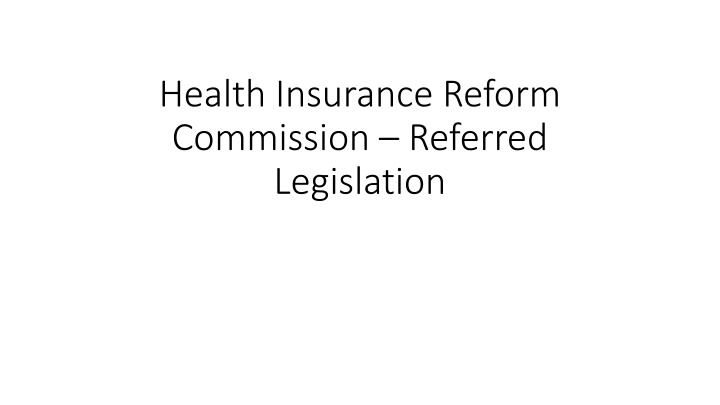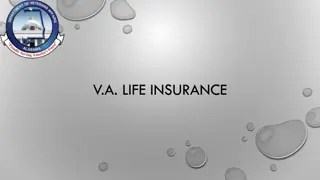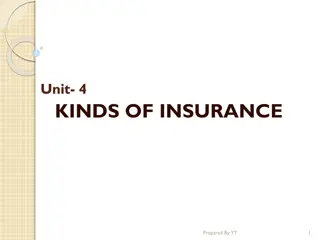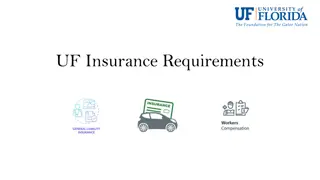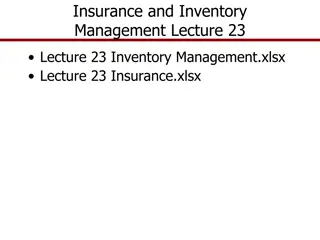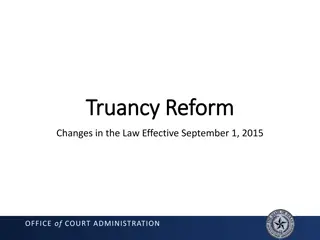Health Insurance Reform Commission Referred Legislation Overview
This overview highlights the process and criteria involved in assessing proposed health insurance mandates by the Health Insurance Reform Commission. It explains the steps, assessments, and reports required for evaluating mandated benefits, including financial impacts and public health considerations.
Download Presentation

Please find below an Image/Link to download the presentation.
The content on the website is provided AS IS for your information and personal use only. It may not be sold, licensed, or shared on other websites without obtaining consent from the author.If you encounter any issues during the download, it is possible that the publisher has removed the file from their server.
You are allowed to download the files provided on this website for personal or commercial use, subject to the condition that they are used lawfully. All files are the property of their respective owners.
The content on the website is provided AS IS for your information and personal use only. It may not be sold, licensed, or shared on other websites without obtaining consent from the author.
E N D
Presentation Transcript
Health Insurance Reform Commission Referred Legislation
Proposed Mandated Benefits Review Process 1. Chair of the House Labor and Commerce or the Senate Commerce and Labor Committee requests the Commission to assess a proposed health insurance mandate. The Commission has 24 months to complete this assessment. 2. After receiving a request from the Chair, the Commission may request the Bureau of Insurance (BOI) to conduct a STEP ONE assessment under 30-343 B of the Code. The assessment will address: whether the Exchange would likely determine that the proposed mandate exceeds the scope of the essential health benefit as defined according to the Affordable Care Act, and the extent to which the coverage in the proposed mandate is already available under qualified health plans offered through the Exchange.
3. BOI will (a) provide the Commission with a memorandum presenting the results of the Step One assessment, and (b) present the results at a scheduled Commission meeting. The memorandum and presentation will provide background information about the mandate and address whether the mandate likely exceeds the scope of the essential health benefit, whether the mandate would likely lead to increased state costs, and the extent to which coverage in the proposed mandate is already available. 4. Using the Step One assessment, the Commission will determine whether further assessment of the proposed mandate is warranted under 30-343 C of the Code. If the Commission determines further assessment is warranted, it will request JLARC and BOI to conduct a STEP TWO assessment.
5. JLARC and BOI will (a) provide the Commission with two separate but coordinated reports presenting the results of the Step Two assessments and (b) present the results at a scheduled Commission meeting. JLARC Assessment Current Status and Social Need for Proposed Mandate Background on proposed coverage and medical condition Medical efficacy and effectiveness of proposed coverage Current availability and utilization of treatment Current financial impact on individuals without coverage for treatment Proposed mandate s consistency with the purpose of health insurance and impact on public health BOI Assessment Financial Impact of Proposed Mandate Expected impact on utilization of services and providers Expected impact on premium costs and administrative cost of insurers Expected additional cost to the state as required by 1311(d)(3)(B) of the Patient Protection and Affordable Care Act Expected impact on the total cost of health care in the Commonwealth generally
2019 Legislation H.B. 2710 (Campbell, J.L.) provides for direct reimbursement by a health plan to a law-enforcement agency that provides transportation to a covered person subject to an emergency custody order or a temporary detention order, if the health plan provides coverage for such transportation. As it involves a mandated provider, a determination of whether the bill would create a new mandated benefit that exceeds the EHBs was not applicable. H.B. 2598 (Hayes) and S.B. 1624 (Barker) provide that if a policy or contract that covers services that a registered surgical assistant may legally perform, equal coverage must be provided for such services when rendered by a registered surgical assistant. As the bills involve a mandated provider, a determination of whether they would create a new mandated benefit that exceeds the EHBs was not applicable.
2019 Legislation H.B. 2669 (Roem) would require coverage for medically necessary prosthetic devices and their repair, fitting, replacement, and components. Because Virginia currently requires carriers to offer coverage for prosthetic devices, the BOI characterized this bill as an extension of an existing EHB rather than as a new benefit for which the Commonwealth would be required to defray the cost. H.B. 2177 (Murphy) would require coverage for medically necessary formula and enteral nutrition products. The current benchmark plan covers infusion services, including enteral nutrition therapy. The Commission requested and received a Step Two assessment in 2019 and recommended the bill to the General Assembly.
2019 Legislation S.B. 1010 (Black) would require coverage for long-term antibiotic therapy for a patient with Lyme disease when determined to be medically necessary and ordered by a licensed physician after making a thorough evaluation of the patient's symptoms, diagnostic test results, or response to treatment. The BOI reported that, pursuant to guidance from the Centers for Medicare & Medicaid Services, state mandates related to the coverage of specific drugs that goes beyond the number of drugs offered in the benchmark plan does not exceed EHBs. As a result, enactment of this mandate would not require the Commonwealth to defray the cost. H.B. 2049 (Carroll Foy) and S.B. 1650 (Howell) would require coverage for expenses incurred in the provision of pasteurized donated human breast milk. The BOI characterized this mandate as a new benefit exceeding the EHBs and as a result the Commonwealth could be required to reimburse the federal government for associated costs.
2019 Legislation H.B. 2601 (Plum) would require coverage for the billed charges of one hearing aid per hearing impaired ear in an amount not to exceed $3,000 per hearing aid for minors. Coverage for hearing aids is specifically excluded from the current benchmark plan. The BOI characterized this mandate as a new benefit exceeding the EHBs and as a result the Commonwealth could be required to reimburse the federal government for associated costs. Ms. Tompkins also noted that the bill purports to exempt plans offered through the exchange from the coverage requirements to the extent that it would require benefits that exceed the EHBs, while continuing to apply the requirements to plans offered outside the exchange. The ACA provides that state standards or requirements implementing, or related to, standards or requirements in Title I of the ACA must be applied uniformly to all health plans in each insurance market to which the standard and requirement apply. Therefore, this element of the bill appears to be inconsistent with the ACA.
2020 Legislation H.B. 39 (Samirah) Health benefit plans; enrollment by pregnant individuals. Requires health carriers to allow pregnant individuals to enroll in a health benefit plan at any time after the commencement of the pregnancy, with the pregnant individual's coverage being effective as of the first of the month in which the individual receives certification of the pregnancy. H.B. 59 (Ware) Health carriers; licensed athletic trainers. Requires health insurers and health service plan providers whose policies or contracts cover services that may be legally performed by a licensed athletic trainer to provide equal coverage for such services when rendered by a licensed athletic trainer.
2020 Legislation H.B. 442 (Carroll-Foy) Health insurance; coverage for donated human breast milk. Requires health insurers, corporations providing health care coverage subscription contracts, and health maintenance organizations to provide coverage for expenses incurred in the provision of pasteurized donated human breast milk. The requirement applies if the covered person is an infant under the age of six months, the milk is obtained from a human milk bank that meets quality guidelines established by the Department of Health, and a licensed medical practitioner has issued an order for an infant who satisfies certain criteria. H.B. 503 (Roem) / S.B. 382 (McPike) Health insurance; coverage for prosthetic devices. Requires health insurers, corporations providing health care coverage subscription contracts, health maintenance organizations, and the Commonwealth's Medicaid program to provide coverage for prosthetic devices, including myoelectric, biomechanical, or microprocessor-controlled prosthetic devices that have a Medicare code. The measure repeals the existing requirement that coverage for prosthetic devices be offered and made available.
2020 Legislation H.B. 579 (Guzman) Health insurance; coverage for mammograms. Requires health insurers to provide coverage for low-dose screening mammograms at rates that are more frequent than is currently required if the covered individual has a family history of breast cancer. If the individual has a family history of breast cancer, the bill requires coverage for annual mammograms from age 30 through 49 and biannual mammograms starting at age 50. However, the age at which such coverage of annual mammograms starts shall be younger than 30 if the covered individual's mother was diagnosed with breast cancer at an age earlier than 40, in which event coverage starts during the year that the individual attains an age that is 10 years younger than the age of the individual's mother at the time of her diagnosis. H.B. 776 (Helmer) Health insurance; coverage for fertility preservation procedures for cancer patients. Requires health insurance policies, subscription contracts, and health care plans to provide coverage for standard fertility preservation procedures that are medically necessary to preserve the fertility of a covered individual due to the covered individual's receiving cancer treatment that may directly or indirectly cause iatrogenic infertility.
2020 Legislation H.B. 645 (Price) Health insurance; coverage for diabetes. Requires health insurers, health care subscription plans, and health maintenance organizations to include coverage for insulin, certain equipment, certain supplies, regular foot care and eye care exams, and up to three in-person outpatient self-management training and education visits upon an individual's initial diagnosis of diabetes and up to two such visits upon a significant change in an individual's condition. The bill provides greater specificity than the current law requiring coverage for equipment, supplies, and self-management training and education visits. The bill also provides that benefits or services required for the treatment of diabetes is exempt from any deductible.
2020 Legislation H.B. 1036 (Rasoul)Preventive services; coverage for outpatient mental health screenings or visits. Requires a health carrier to provide coverage as a preventive service for at least six annual therapy or counseling outpatient screenings or visits with a licensed mental health professional for the early detection or prevention of mental illness. Health carriers are prohibited from imposing any cost-sharing requirements for mandated preventive services. H.B. 1594 (Cole, J.G.) Health insurance; mandated coverage for hearing aids for minors. Requires health insurers, health maintenance organizations, and corporations providing health care coverage subscription contracts to provide coverage for hearing aids and related services for children 18 years of age or younger when a licensed audiologist prescribes such hearing aids and related services. The coverage includes one hearing aid per hearing-impaired ear, up to a cost of $1,500, every 24 months.
2020 Legislation H.B. 1384 (Robinson) Health insurance; provider contracts; business practices; penalties. Provides that amendments to a provider contract or any material provision, addenda, schedule, exhibit, or policy thereto, as it relates to any material provision that was agreed to or accepted by the provider in the previous 12- month period, or that occurred during the current term of the provider contract and resulted in an adverse change, are not effective unless agreed to by the provider in writing. The measure requires such an amendment to be agreed to by the provider in a signed written amendment to the provider contract. The measure defines a material provision of a provider contract as any policy manual, coverage guideline, edit, multiple procedure logic, or audit procedure that (i) decreases the provider's payment or compensation, (ii) limits an enrollee's access to covered services under his health plan, or (iii) changes the administrative procedures applicable to a provider contract in a way that may reasonably be expected to significantly increase the provider's administrative expense. The measure requires carriers to permit a provider to determine the carrier's policies regarding the use of edits or multiple procedure logic. The measure requires carriers to provide, for each health plan in which the provider participates or is proposed to participate, a complete fee schedule for all health care services included under the provider contract with the provider in writing and to make such fee schedules available in machine-readable electronic format. The measure requires a provider contract to permit a provider a minimum of one year from the date a health care service is rendered to submit a claim for payment, unless otherwise agreed upon. The measure also (a) requires the State Corporation Commission to assist providers and to examine and investigate provider complaints and inquiries relating to an alleged or suspected failure by a carrier to comply with required minimum fair business standards, (b) requires the Commission to provide a determination of whether a carrier has failed to comply with these standards within 60 days of receipt of a provider's complaint or inquiry, (c) authorizes the Commission to determine whether a carrier's practices comply with these standards, (d) subjects a person that refuses or fails to provide information in a timely manner to the Commission to enforcement and penalty provisions, and (e) authorizes the Commission to impose penalties or issue a cease and desist order to a carrier that fails to comply with these standards.
2020 Legislation S.B. 192 (Peake) Health insurance; physical therapist office visit; cost- sharing requirements. Prohibits health insurers, corporations providing health care coverage subscription contracts, and health maintenance organizations whose policies, contracts, or plans include coverage for physical therapy from imposing any cost-sharing requirements such as a copayment, coinsurance, or deductible for a physical therapist office visit that exceeds the cost-sharing requirements for a physician or osteopath office visit. S.B. 1086 (Pillion) Health insurance; coverage for infertility treatment. Requires health insurance policies, subscription contracts, and health care plans, including plans administered by the Department of Medical Assistance Services, to provide coverage for infertility treatment.
2020 Legislation S.B. 467 / S.B. 867 (Petersen) Health care provider panels; vertically integrated carriers; providers. Requires any vertically integrated carrier to offer participation in each provider panel or network established for each of the vertically integrated carrier's policies, products, and plans, including all policies, products, and plans offered to individuals, employers, and enrollees in state and federal government benefit programs, to every provider in the Commonwealth under the same terms and conditions that apply to providers under common control with the vertically integrated carrier. The measure requires that the offered participation (i) be without any adverse tiering or other financial incentives that may discourage enrollees from utilizing the services of the provider, (ii) include all sites and services offered by the provider, and (iii) take into account the different characteristics of different providers with regard to the range, nature, cost, and complexity of services offered. The measure prohibits an officer or director of a vertically integrated carrier from simultaneously serving as an officer or director of an entity that owns, operates, manages, or controls an acute care hospital located, in whole or in part, in the Commonwealth. The measure defines "vertically integrated carrier" as a health insurer or other carrier that owns an interest in, is owned by, or is under common ownership or control with an acute care hospital facility, excluding an entity that is under the ultimate control of or under common control with a public hospital.
2020 Legislation S.B. 423 (DeSteph) Health insurance; mandated coverage for hearing aids for minors. Requires health insurers, health maintenance organizations, and corporations providing health care coverage subscription contracts to provide coverage for hearing aids and related services for children 18 years of age or younger when an otolaryngologist recommends such hearing aids and related services. The coverage includes one hearing aid per hearing-impaired ear, up to a cost of $1,500, every 24 months. Item 487 C. 1 3 of the 2020 2022 Appropriation Act requires the Commission to perform assessment and BOI/JLARC to examine whether changes could be made to the benchmark plan
